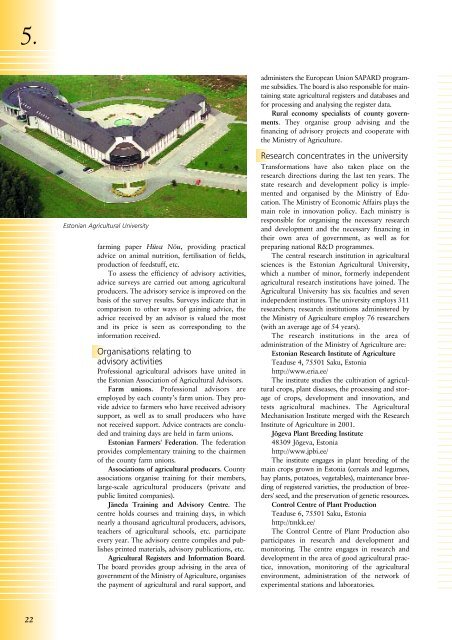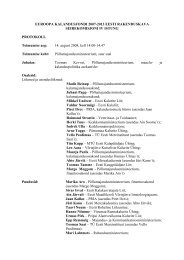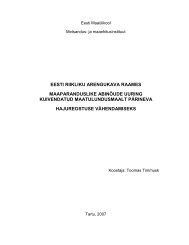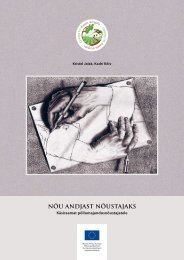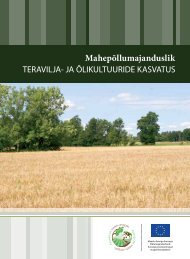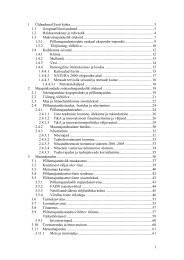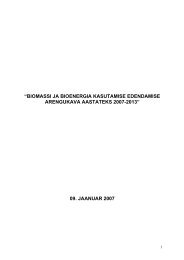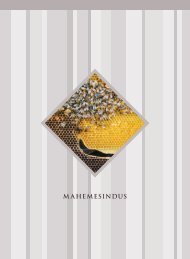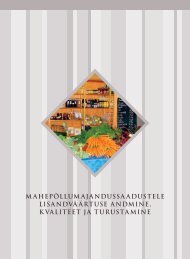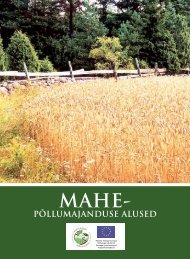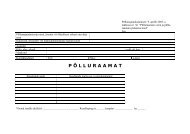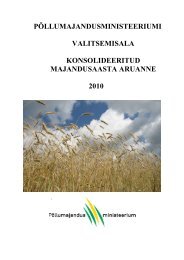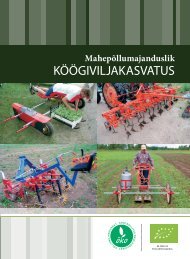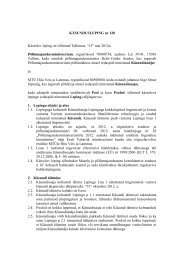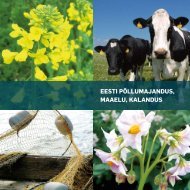estonian agriculture, rural economy and food industry
estonian agriculture, rural economy and food industry
estonian agriculture, rural economy and food industry
You also want an ePaper? Increase the reach of your titles
YUMPU automatically turns print PDFs into web optimized ePapers that Google loves.
5.<br />
administers the European Union SAPARD programme<br />
subsidies. The board is also responsible for maintaining<br />
state agricultural registers <strong>and</strong> databases <strong>and</strong><br />
for processing <strong>and</strong> analysing the register data.<br />
Rural <strong>economy</strong> specialists of county governments.<br />
They organise group advising <strong>and</strong> the<br />
financing of advisory projects <strong>and</strong> cooperate with<br />
the Ministry of Agriculture.<br />
Estonian Agricultural University<br />
farming paper Hüva Nõu, providing practical<br />
advice on animal nutrition, fertilisation of fields,<br />
production of feedstuff, etc.<br />
To assess the efficiency of advisory activities,<br />
advice surveys are carried out among agricultural<br />
producers. The advisory service is improved on the<br />
basis of the survey results. Surveys indicate that in<br />
comparison to other ways of gaining advice, the<br />
advice received by an advisor is valued the most<br />
<strong>and</strong> its price is seen as corresponding to the<br />
information received.<br />
Organisations relating to<br />
advisory activities<br />
Professional agricultural advisors have united in<br />
the Estonian Association of Agricultural Advisors.<br />
Farm unions. Professional advisors are<br />
employed by each county’s farm union. They provide<br />
advice to farmers who have received advisory<br />
support, as well as to small producers who have<br />
not received support. Advice contracts are concluded<br />
<strong>and</strong> training days are held in farm unions.<br />
Estonian Farmers' Federation. The federation<br />
provides complementary training to the chairmen<br />
of the county farm unions.<br />
Associations of agricultural producers. County<br />
associations organise training for their members,<br />
large-scale agricultural producers (private <strong>and</strong><br />
public limited companies).<br />
Jäneda Training <strong>and</strong> Advisory Centre. The<br />
centre holds courses <strong>and</strong> training days, in which<br />
nearly a thous<strong>and</strong> agricultural producers, advisors,<br />
teachers of agricultural schools, etc. participate<br />
every year. The advisory centre compiles <strong>and</strong> publishes<br />
printed materials, advisory publications, etc.<br />
Agricultural Registers <strong>and</strong> Information Board.<br />
The board provides group advising in the area of<br />
government of the Ministry of Agriculture, organises<br />
the payment of agricultural <strong>and</strong> <strong>rural</strong> support, <strong>and</strong><br />
Research concentrates in the university<br />
Transformations have also taken place on the<br />
research directions during the last ten years. The<br />
state research <strong>and</strong> development policy is implemented<br />
<strong>and</strong> organised by the Ministry of Education.<br />
The Ministry of Economic Affairs plays the<br />
main role in innovation policy. Each ministry is<br />
responsible for organising the necessary research<br />
<strong>and</strong> development <strong>and</strong> the necessary financing in<br />
their own area of government, as well as for<br />
preparing national R&D programmes.<br />
The central research institution in agricultural<br />
sciences is the Estonian Agricultural University,<br />
which a number of minor, formerly independent<br />
agricultural research institutions have joined. The<br />
Agricultural University has six faculties <strong>and</strong> seven<br />
independent institutes. The university employs 311<br />
researchers; research institutions administered by<br />
the Ministry of Agriculture employ 76 researchers<br />
(with an average age of 54 years).<br />
The research institutions in the area of<br />
administration of the Ministry of Agriculture are:<br />
Estonian Research Institute of Agriculture<br />
Teaduse 4, 75501 Saku, Estonia<br />
http://www.eria.ee/<br />
The institute studies the cultivation of agricultural<br />
crops, plant diseases, the processing <strong>and</strong> storage<br />
of crops, development <strong>and</strong> innovation, <strong>and</strong><br />
tests agricultural machines. The Agricultural<br />
Mechanisation Institute merged with the Research<br />
Institute of Agriculture in 2001.<br />
Jõgeva Plant Breeding Institute<br />
48309 Jõgeva, Estonia<br />
http://www.jpbi.ee/<br />
The institute engages in plant breeding of the<br />
main crops grown in Estonia (cereals <strong>and</strong> legumes,<br />
hay plants, potatoes, vegetables), maintenance breeding<br />
of registered varieties, the production of breeders'<br />
seed, <strong>and</strong> the preservation of genetic resources.<br />
Control Centre of Plant Production<br />
Teaduse 6, 75501 Saku, Estonia<br />
http://tmkk.ee/<br />
The Control Centre of Plant Production also<br />
participates in research <strong>and</strong> development <strong>and</strong><br />
monitoring. The centre engages in research <strong>and</strong><br />
development in the area of good agricultural practice,<br />
innovation, monitoring of the agricultural<br />
environment, administration of the network of<br />
experimental stations <strong>and</strong> laboratories.<br />
22


